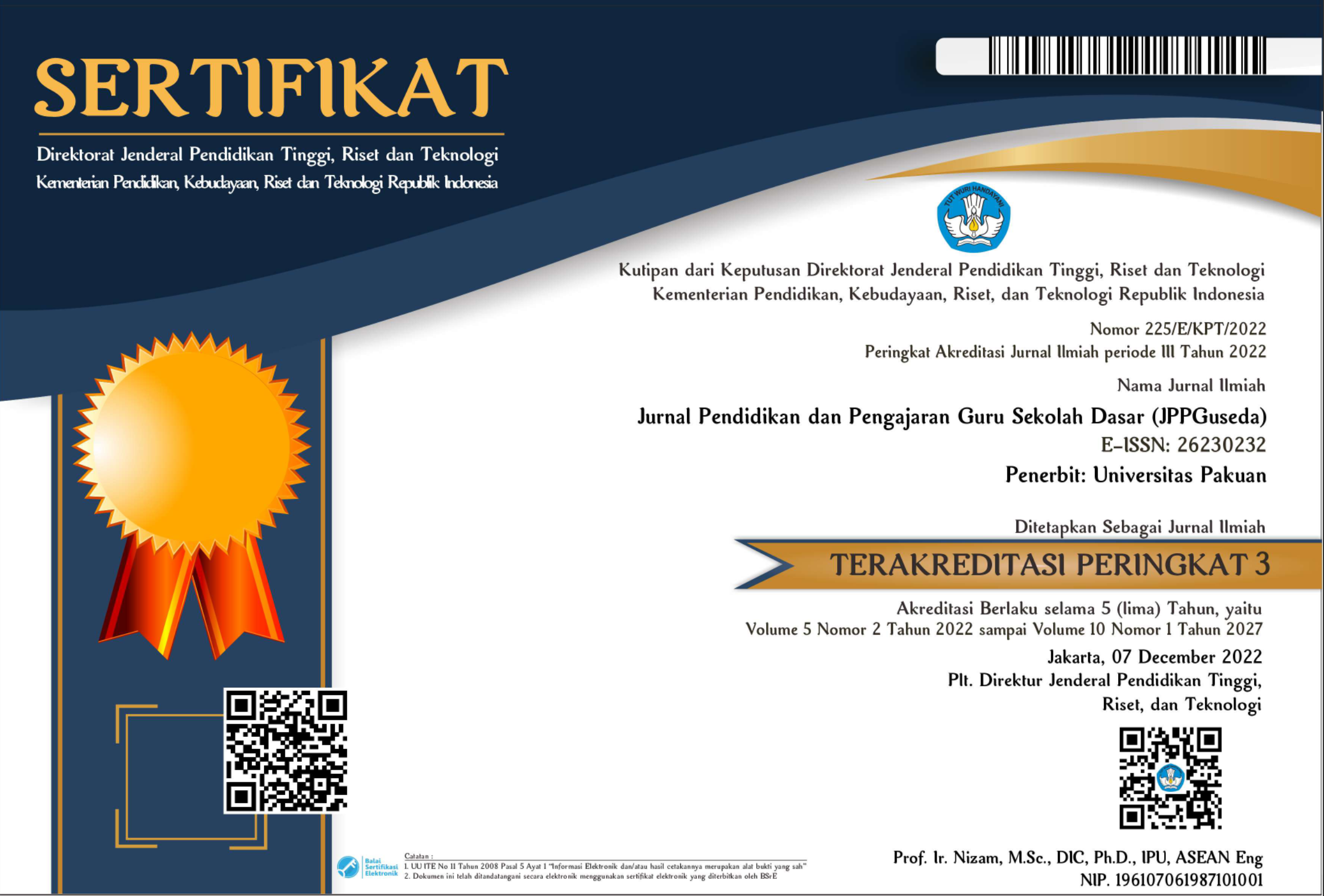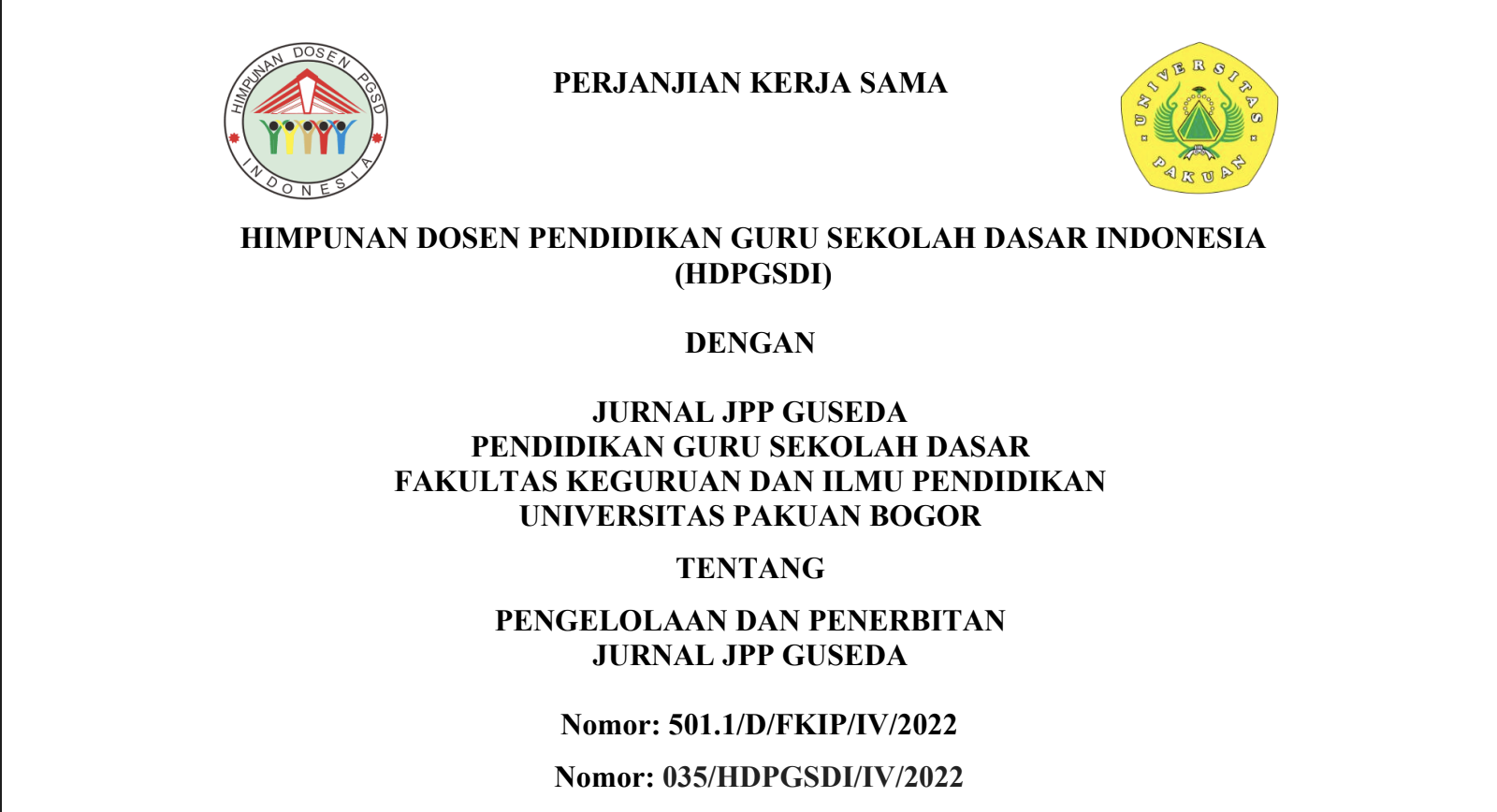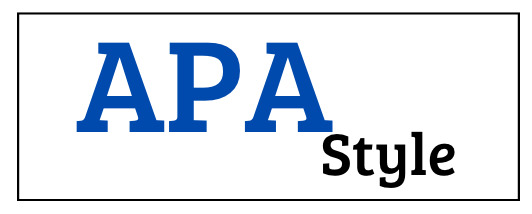PRAKTIKUM SEBAGAI MEDIA KOMPETENSI PEDAGOGIK GURU SEKOLAH DASAR
Abstract
PRACTICUM AS A MEDIA FOR PEDAGOGIC COMPETENCY PRIMARY SCHOOL TEACHERS
Teacher problems will be increasingly complex, where teachers must have competence in dealing with technological developments. Responding to technological challenges has become the basis of human life. Prepare students who are qualified and able to compete globally, and master technology. The research objective was to improve the pedagogical competence of elementary school teachers through practicum training. The activities in this study consisted of diagnosis, action planning, action taking and action evaluation. Data collection techniques using observation techniques. The observation instrument used was a teacher's ability assessment tool in the form of: 1) learning media development instrument, 2) teacher ability assessment instrument in compiling lesson plans. The data analysis used was a comparative descriptive analysis technique. The quantitative data obtained are described in the form of words or explanations. Then the data comparison was carried out to ensure that there was an increase in the ability of teachers to increase the ability of teachers to develop learning media and prepare lesson plans. The results showed that the practicum can improve a) the ability of elementary school teachers to develop learning media by 27.8%. b) Increasing the ability of elementary school teachers in preparing lesson plans by 39.7%, the findings were successful. From the t-test results, it was found that there were significant differences. This means that understanding of concepts and Science Process Skills (SPS) increases after the teacher experiences the practical learning process of science learning material in practicum. From the results, the average value of conceptual understanding increased from 62.42 to 86.68 and the average value of science process skills increased from 56.19 to 87.86. 94% of teachers responded positively, namely agreeing and strongly agreeing that the science learning process with practicum can improve science process skills and understanding of subject matter for elementary teachers.
Keywords
References
B. Trilling and C. Fadel, 21st Century Skills: Learning for Life in Our Times, vol. 47, no. 10. California: John Wiley & Sons, Inc, 2009.
Y. Suchyadi and N. Karmila, The Application Of Assignment Learning Group Methods Through Micro Scale Practicum To Improve Elementary School Teacher Study Program College Students Skills And Interests In Following Science Study Courses,†JHSS (Journal Humanit. Soc. Stud., vol. 03, no. 02, pp. 9598, 2019.
M. N. Sheeba, An Anatomy of Science Process Skills in The Light of the Challenges to Realize Science Instruction Leading to Global Excellence in Education,†Educ. Confab Journals, vol. 2, no. 4, pp. 15421546, 2013.
D. Druckman and N. Ebner, Discovery Learning in Management Education: Design and Case Analysis,†J. Manag. Educ., vol. 42, no. 3, pp. 347374, 2018.
F. Abd-El-Khalick et al., Inquiry in science education: International perspectives, vol. 88, no. 3. New York: Wiley Periodicals, Inc, 2004.
B. . Beyer, Teaching Thinking Skills: A Handbook for Elementary School Teachers. New York: Allyn & Bacon, 1991.
A. A. Carin and R. B. Sund, Teaching Science Through Discovery, Virginia., vol. 01, no. 01. Merrill, 2010.
W. . Houston, Touch the Future Teach. New York: West Publishing Company.
A. O. Akinbobola and F. Afolabi, Constructivist practices through guided discovery approach: The effect on students cognitive achievements in Nigerian senior secondary school physics,†Bulg. J. Sci. Educ. Policy, vol. 3, no. 2, pp. 233252, 2009.
Hikmawati, The Use of Process Skills Approach in Improving Student Learning Outcomes in Class V SDN 51 Lambari,†J. Publ. Pendidik., vol. 2, no. 1, pp. 4453, 2012.
A. Tauï¬ qurrohman, Ability Analysis Class II Students on Skills Observation through Practicum Learning Micro Scale. Bandung: UPI Bandung, 2000.
G. Dwiyanti, Development of Micro-Scale Organic Chemistry Practicum Implementation Models in LPTK. Bandung: UPI Bandung, 2002.
M. Hubbi, I. W. Dasna, and S. Wonorahardjo, The Effect of Colligative Practicum Learning Strategies on Student Learning Outcomes of Class Xii,†EduChemia (Jurnal Kim. dan Pendidikan), vol. 2, no. 1, pp. 5262, 2017.
H. Kusumawati, Application Of Group Assignment Methods To Learning Achievement In Main Materials Of Destination Systems In Human, vol. 01, no. 01. Lampung: Universitas Lampung, 2006.
DOI: 10.55215/jppguseda.v3i2.2737
 Abstract views : 1804
Abstract views : 1804
Refbacks
- There are currently no refbacks.
Copyright (c) 2020 Jurnal Pendidikan dan Pengajaran Guru Sekolah Dasar (JPPGuseda)

This work is licensed under a Creative Commons Attribution-NonCommercial 4.0 International License.




















